|
ACP Felicia Wong Leung Kam-shan, BBS

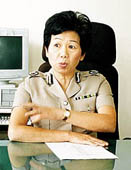
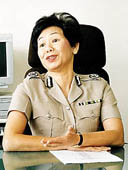
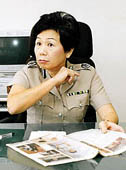
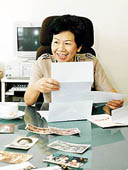
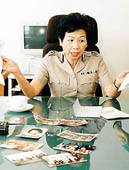
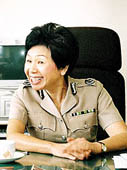
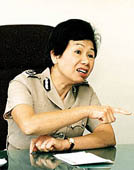
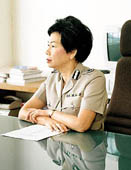
SINCE Felicia Wong joined the
Hong Kong Police as a Probationary Inspector in April 1963, the Force has expanded
from 9,436 officers to its present strength of more than 34,000. It has emerged from
being a small colonial paramilitary organisation to a large and highly sophisticated law
enforcement body with an effective internal security capability. And Felicia Wong Leung
Kam-shan has been there every step of the way, playing what Commissioner of Police
Eddie Hui Ki-on described as "a significant role in this development enabling the Force
to keep pace with the rapid expansion of the population and the associated policing
problems."
Said Mr Hui: "Her experience and ability have been of invaluable service to me
and her high standard of duty performance has earned her the regard and respect of her
colleagues. She has served the Government, the Force and the community of Hong
Kong well."
Not bad for a lady who in 1961 was initially rejected (despite coming first among
those sitting for the written exam) from joining the Force and who might have continued
her career as a school teacher had it not been for her tenacity, dislike of bureaucracy -
and temper.
"I got a letter: 'We regret to inform you that your application has not been
successful'," recalls Mrs Wong who came to Hong Kong with her parents as a two-way
permit holder in 1953. "I was not happy! So I wrote back that I would like to know why
I was rejected. They told me I failed the eyesight test. I was still not happy with that
explanation because I believed I had perfect eyesight, so I wrote a long letter demanding
to know what the Force eyesight requirement was. I wrote three times and appealed
against the decision."
Then, in 1963, while teaching at St Clair Girls' School, she was contacted by the
recruitment officer on whom her persistence had obviously made an impression and asked
if she was still interested in joining the Force. "By then police policy had changed, they
wanted to recruit women with good qualifications and had accepted a women Hong Kong
University graduate who was slightly short-sighted. They also remembered me," said Mrs
Wong.
So, against her parents' wishes, who were both school teachers and who thought
being a police officer was too dangerous, then-Felicia Leung Kam-shan joined the Hong
Kong Police. In 1963 at Police Training School during that intake Eddie Hui Ki-on was
two squads ahead of her, and Peter Wong Tsan-kwong was still under training when she
passed out. The total strength of women police then was 361 and she was one of the 14
Women Inspectors.
"It was a male dominated profession and women officers (a separate establishment
in those days), were treated as second class citizens," says Madame Wong. "We were
confined to the traditional role of looking after women and juveniles. Our salary was
three-quarters of our male counterparts.
"Eventually radical changes began to take place as the Force realised that our talents
were under-utilised and decided that the spectrum and work undertaken by women should
be broadened. This resulted in a combined establishment of men and women and a policy
of integration and expansion. The decision to arm women officers in 1995 has further
boosted this development."
There are now women officers in practically every field of police work, and many
in command posts. With a current strength of 3,362, women officers form an integral part
of the Force establishment and share the responsibility of policing Hong Kong with their
male colleagues. The Force is fully committed to the principle of equal opportunity and
although Madame Wong is the first to acknowledge that her career has benefited from it,
she had to prove herself every step of the way.
"Being the first did impose stress," she says. "Failure would affect my career, yes.
But even more on my mind was that my failing would affect the future development of
women police into busy, high-ranking operational posts. That was the real burden I felt.
"Initially people looked at me as a novelty," she laughs, gesturing to the fact that
she is a woman and of diminutive size. "You have to prove that you are in the post because
you have the ability and are qualified."
Looks, of course, can be deceiving. And even in her earlier days as a Woman Inspector
many a miscreant had misjudged her abilities - at their own peril. "One night while on a
raid I chased a drug dealer who ran into a toilet and locked himself in a cubicle. He thought
I was intimidated and would just leave. So I kicked down the door and arrested him," she
laughs.
Another time, during the course of a raid on a vice apartment, then-Woman Inspector
Wong along with four junior women police officers discovered an illegal gambling den: "I
decided to arrest the lot and take the exhibits back to the station, but when I called for a police
lorry to come pick them up there were none available. So, I yelled: 'Hard luck, no police
transport today! You're all going to have to walk back to the station!'"
She ordered the 20 male gamblers to give her their ID cards, the gambling proceeds
and then made them carry the evidence (majong tiles, tables, chairs) along the streets of
Kowloon City to the police station. All the way the men complained about their heavy burdens,
while Mrs Wong kept prodding them to hurry up and to get back in line. They even asked if
they could take a taxi. But Mrs Wong refused - although she did allow them to take a tea break
at a dai pai dong. "I said: 'As long as you pay for it, okay.'
"The next day I appeared in court and afterwards the presiding magistrate asked me
how five police women had gotten 20 men to obey our orders and walk to the station. I said
there was no resistance because I took their ID cards - and their money! We became good
friends after that."
Pauses Mrs Wong: "Looking back, from a Woman Inspector to ACP - it has been
demanding but extremely challenging and rewarding. I feel lucky to have joined an organisation
with enough foresight to allow myself and my colleagues the opportunity to develop our potential."
The Force is equally as lucky.
On promotion to Gazetted Officer rank in 1976, she successfully held a variety of
important posts including Superintendent of Accident Investigation in Hong Kong Island.
On promotion to Senior Superintendent in 1981, she assumed the office of Senior Staff Officer,
Administration Kowloon, followed by postings as Senior Staff Officer of Police Headquarters
Development, Deputy District Commander Kowloon City, and District Commander Airport.
She was appointed to Directorate grade in March 1987 after her promotion to Chief
Superintendent of Police when she took up the post of District Commander Kowloon City.
With 800 officers under her command she proved to be an effective, authoritative leader with
a close and well-nurtured working relationship with the local community. She was also
personally involved in the difficult and politically sensitive clearance of the Kowloon Walled
City at the time.
In April 1989 Mrs Wong attended the demanding overseas command course for senior
officers at the Police Staff College, Bramshill, where her enthusiasm, determination and sound
judgement was favourably commented upon. Her course project on Policing Implications of
1997 in Hong Kong was selected as a Bramshill paper now kept in its college library for
reference - another first for the Hont Kong Police Force.
Her next posting was as District Commander in Eastern District. Two years later she
was selected for transfer to the Force Inspection Wing, and in 1993 became Deputy Regional
Commander Kowloon West.
Then in 1995 , as an ACP she continued to distinguish herself through dedicated and
exemplary service as Regional Commander, New Territories North - especially in combating
crime and illegal immigration in the approach of 1997 and the transition of sovereignty. It
earned her the Bronze Bauhinia Star medal.
"Now I have now come to the end of my useful lifespan in the Force. Life will not be
the same. I'll miss the Force. Looking back over my 35 years of service, I feel very lucky to
have had fellow officers in the Force and other Government departments who have never
failed to give me guidance, encouragement and support for which I am forever grateful. I
thank the Force for affording me the opportunity to display my worth - but the greatest benefit
of all was finding of a good and dutiful husband."
The concept of good things coming in small packages certainly applies to Madame
Wong.

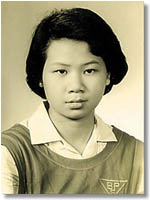
Felicia Wong Leung Kam-shan
the school girl
|
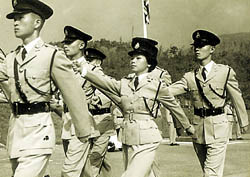
The Woman Probationary Inspector on her
passing out parade in 1963
|
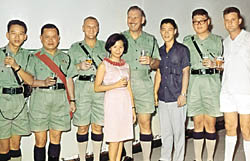
The vivacious Woman Inspector enjoying
a drink with her mess mates
|
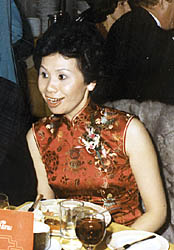
The Deputy District Commander
at the Kowloon Regional Police
Ball
|
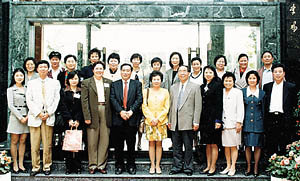
The ACP RC NTN leading a delegation of senior woman
officers to meet their counterparts in Guangdong
|
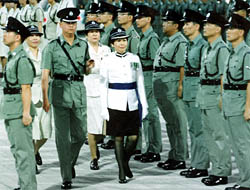
Performing her final act as ACP Wong -
reveiwing last week's Auxy passing out
|
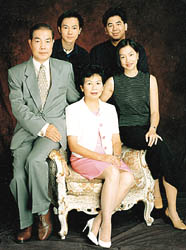
The mother and wife
|
|






















![]()
